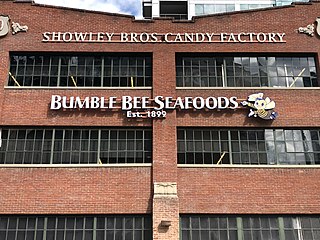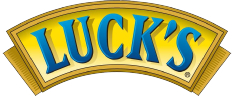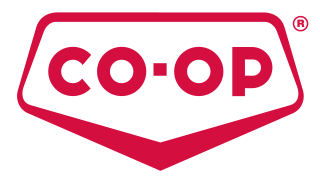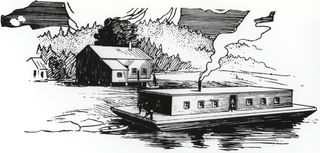
Armour & Company was an American company and was one of the five leading firms in the meat packing industry. It was founded in Chicago, in 1867, by the Armour brothers led by Philip Danforth Armour. By 1880, the company had become Chicago's most important business and had helped make Chicago and its Union Stock Yards the center of America's meatpacking industry. During the same period, its facility in Omaha, Nebraska, boomed, making the city's meatpacking industry the largest in the nation by 1959. In connection with its meatpacking operations, the company also ventured into pharmaceuticals and soap manufacturing, introducing Dial soap in 1948.

Maple Leaf Foods Inc. is a Canadian multinational consumer-packaged meats and food production company. Its head office is in Mississauga, Ontario.

Van Camp's is an American brand of canned bean products currently owned by ConAgra Foods, Inc. Their products typically consist of beans stewed in a flavored sauce. Van Camp's has for some time been the second-best selling brand of baked beans in the United States, competing with Bush's Baked Beans.

Del Monte Foods Inc. is an American food production and distribution company headquartered in Walnut Creek, California. Del Monte Foods is one of the country's largest producers, distributors and marketer of branded processed food for the U.S. retail market, generating approximately $1.73 billion of annual sales. Its portfolio of brands includes Del Monte, S&W, Contadina, College Inn, Kitchen Basics, Joyba, and Take Root. Greg Longstreet is the current Chief Executive Officer of the Del Monte Foods. Several Del Monte products hold the number one or two market share position. The company also produces, distributes and markets private-label food.

Premium Brands Holdings Corporation is a Canadian specialty food manufacturing and distribution company. It is a publicly traded corporation on the Toronto Stock Exchange.

The Gulf of Georgia Cannery is a National Historic Site of Canada located in Steveston village in Richmond, British Columbia.
Robert Cunningham (1837–1905) was a British-Canadian lay missionary turned entrepreneur who founded the town of Port Essington, British Columbia.

The Alaska Packers' Association (APA) was a San Francisco-based manufacturer of Alaska canned salmon founded in 1891 and sold in 1982. As the largest salmon packer in Alaska, the member canneries of APA were active in local affairs, and had considerable political influence. The Alaska Packers' Association is best known for operating the "Star Fleet," the last fleet of commercial sailing vessels on the West Coast of North America, as late as 1927.

Bumble Bee Foods, LLC, is a company that produces canned tuna, salmon, other seafoods, and chicken under the brand names "Bumble Bee," "Wild Selections," "Beach Cliff," "Brunswick," and "Snow's." The brand is marketed as "Clover Leaf" in Canada. The company is headquartered in San Diego, California, United States. It is owned by FCF Co, Ltd. of Taiwan.

Luck's Incorporated was a food production company founded in Seagrove, North Carolina, in 1947, which produced a line of canned bean and other canned food products. For a period of time, it was one of the largest employers in the area and its canned food products were a staple in many Southern homes. It is a brand of Faribault Foods, after a divestment by ConAgra in 2010.

Federated Co-operatives Limited (FCL), operating as Co-op, is a co-operative federation providing procurement and distribution to member co-operatives in Western Canada. It was established in 1944 after a series of amalgamations of smaller cooperatives, starting in Saskatchewan, including the Saskatchewan Co-operative Wholesale Society and a fuel production and distribution co-op, the Consumers’ Co-operative Refinery Limited. Federated had expanded to Manitoba, Alberta, and British Columbia by 1970. Federated Co-operatives is owned by about 160 member co-operatives across the region. Some are large co-operatives, such as Saskatoon Co-op and Calgary Co-op, while others are small co-ops based in small towns, such as Abernethy Co-op.

A salmon cannery is a factory that commercially cans salmon. It is a fish-processing industry that became established on the Pacific coast of North America during the 19th century, and subsequently expanded to other parts of the world that had easy access to salmon.
StarKist Tuna is a brand of tuna produced by StarKist Co., an American company formerly based in Pittsburgh's North Shore that is now wholly owned by Dongwon Industries of South Korea. It was purchased by Dongwon from the American food manufacturer Del Monte Foods on June 24, 2008, for slightly more than $300 million. In 2021, the headquarters were moved to Reston, Virginia.

Canned or tinned fish are food fish which have been processed, sealed in an airtight container such as a sealed tin can, and subjected to heat. Canning is a method of preserving food, and provides a typical shelf life ranging from one to five years. They are usually opened via a can opener, but sometimes have a pull-tab so that they can be opened by hand. In the past it was common for many cans to have a key that would be turned to peel the lid of the tin off; most predominately sardines, among others.

International Home Foods (IHF) was an American manufacturer, distributor and marketer of food products, based in Parsippany, New Jersey. It was acquired in 2000 by ConAgra Foods and merged into ConAgra's Grocery Products division. IHF's best known brands were Chef Boyardee pasta products, Bumble Bee Seafood, PAM cooking spray, and Gulden's mustard.
Connors Brothers Limited was a fish packing company founded by Lewis and Patrick Connors in the 1880s and based in Blacks Harbour, New Brunswick. It is known by the Brunswick brand, and is the only remaining producer of sardines in North America. Brunswick claims to be the largest sardine producer in the world.
Kildonan is an unincorporated community in the Alberni Inlet-Barkley Sound region of the west coast of southern Vancouver Island, British Columbia. The former steamboat landing and ferry dock is on the east shore of Uchuchklesit Inlet, which branches northwest of the lower reaches of Alberni Inlet. Adjacent to Pacific Rim National Park Reserve, the locality is by road and ferry about 120 kilometres (75 mi) southwest of Port Alberni.
Nikola Bezmalinovic, known as Nick Bez was founder of fishing, canning, and shipping companies in Juneau, Alaska. Nick Bez operated the largest fishing ship at the time the 423-foot, Pacific Explorer. Nick Bez also owned and operated the Nornek cannery, two gold mines, Alaska Southern Packing Company, Peter Pan Seafoods, Alaska Southern Airways, Pacific Exploration Company and the Intercoastal Packing Company as well as West Coast Airlines which became part of Air West. Nick Bez became known as a rags to riches entrepreneur. In 1919 Nikola Bezmalinovic changed his name to Nick Bez. Nick Bez died in 1969.















